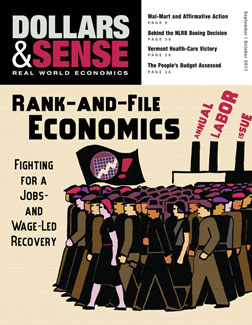
(1) Annual Labor Issue! Our September/October 2011 issue has been printed and is shipping out now. E-subscribers have already received their copies. I have already posted Josh Eidelson's feature on the strikes against Boeing, which the NLRB has said Boeing retaliated against the union for. Here is the table of contents. And here is the p. 2 editorial note:
In a recent piece on AlterNet, freelance journalist Josh Eidelson, author of a feature article in this issue on the strikes against Boeing (p. 20), writes of some good news on the labor front—the union victory of IKEA workers in Danville, Va.: “Their move defies conventional wisdom that a competitive future requires a lower-wage, less unionized America.” The recent strike against Verizon by 45,000 workers with the Communication Workers of America and the International Brotherhood of Electrical Workers is also a hopeful sign that workers are finally pushing back.
But union militancy won’t be enough. In a compelling essay entitled “The Left’s Crisis” in The Bullet, the e-bulletin of the Socialist Project (socialistproject.ca), Canadian political economist Leo Panitch warns that with the destruction of public-sector trade unionism in the balance, a self-confident left has to go beyond protest and challenge fundamental power structures. For one thing, it has to demand public ownership of the banks—not just because they have shown themselves incapable of managing investment in the economy. Public ownership of capital and democratic control over credit is the only way to avoid the veto of the bond market (being felt so painfully in Europe at the moment) and ensure investment in social needs such as housing, transportation, education, pensions, and the technology and human skills needed to meet the ecological crisis.
How to build that self-confident left? What would it take to build a movement to challenge fundamental power structures and demand changes like public ownership of banks? In this issue’s cover story (p. 13), political economist Katherine Sciacchitano suggests that we need a “rank-and-file economics” to counter the dominant right-wing narrative. Union and community organizers on the front lines of the sharpening assault against the working class need to school themselves on the basics of why we find ourselves in the current economic mess: why, in particular, we don’t need to “jumpstart” the economy, but instead to rebuild the U.S. and global economies, and to put jobs and wages front and center in any agenda for recovery.
One of our e-subscribers took great exception to this (partial) sentence in the editorial note: "Public ownership of capital and democratic control over credit is the only way to avoid the veto of the bond market (being felt so painfully in Europe at the moment) ..." The offending phrase is "the veto of the bond market." The subscriber pointed out the difference between the monetary system in the EU and the monetary system in the United States, and rejected the idea that, in the United States at least, where dollars can be created by fiat, the bond market can "veto" economic policy. (He also seemed to reject the idea that that is what is going on in Europe now.)
We'll have a fuller response to post on the blog and/or to run in our Nov/Dec issue, probably by our columnist Arthur MacEwan and/or by Katherine Sciacchitano, the author of our cover article. But here's a quickie response: Even if the term "veto" might be an overstatement in the case of the United States (though surely not, we think, in the case of Europe), we do think that bond markets can exercise constraints on U.S. economic policy, though this is partly for political reasons (which is why the term "veto" might have been misleading, as it suggests that politicians have no choice to bend to the markets' will). But this should have been clear in the context of an editorial note that was arguing precisely for democratic control of credit and the banking system--indeed that was what was urged in the very sentence in question! And the rest of the sentence pointed to other reasons for such democratic control--the need to have a credit system that invests in the real needs of most of the population, which is certainly not happening right now in the United States. But we will investigate this topic more fully here and in the magazine.
If you subscribe to the magazine, we hope you enjoy this year's labor issue! If not, please subscribe or order this issue.
--Chris Sturr
